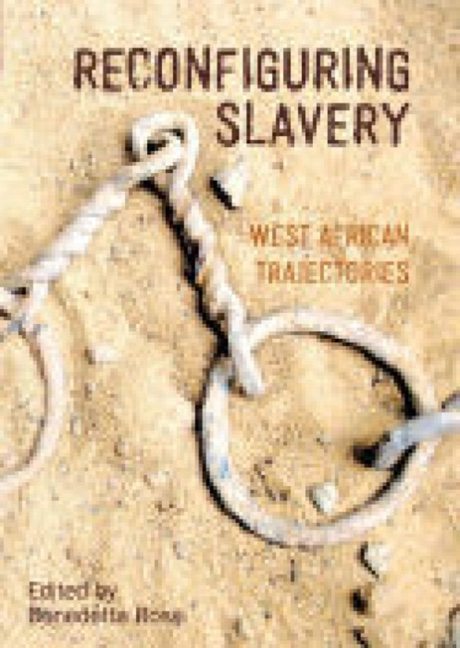Book contents
- Frontmatter
- Content
- List of Figures
- Notes on Contributors
- Preface
- A Note on Language
- Preface to the Second Edition
- 1 Introduction: Rethinking Slavery in West Africa
- 2 Slave Descent and Social Status in Sahara and Sudan
- 3 African American Psychologists, the Atlantic Slave Trade and Ghana: A History of the Present
- 4 After Abolition: Metaphors of Slavery in the Political History of the Gambia
- 5 Islamic Patronage and Republican Emancipation: The Slaves of the Almaami in the Senegal River Valley
- 6 Curse and Blessing: On Post-slavery Modes of Perception and Agency in Benin
- 7 Contemporary Trajectories of Slavery in Haalpulaar Society (Mauritania)
- 8 Slavery and Politics: Stigma, Decentralisation and Political Representation in Niger and Benin
- 9 Slavery and Migration: Social and Physical Mobility in Ader (Niger)
- 10 Discourses on Slavery: Reflections on Forty Years of Research
- Glossary of Foreign Words
- Index
Preface
- Frontmatter
- Content
- List of Figures
- Notes on Contributors
- Preface
- A Note on Language
- Preface to the Second Edition
- 1 Introduction: Rethinking Slavery in West Africa
- 2 Slave Descent and Social Status in Sahara and Sudan
- 3 African American Psychologists, the Atlantic Slave Trade and Ghana: A History of the Present
- 4 After Abolition: Metaphors of Slavery in the Political History of the Gambia
- 5 Islamic Patronage and Republican Emancipation: The Slaves of the Almaami in the Senegal River Valley
- 6 Curse and Blessing: On Post-slavery Modes of Perception and Agency in Benin
- 7 Contemporary Trajectories of Slavery in Haalpulaar Society (Mauritania)
- 8 Slavery and Politics: Stigma, Decentralisation and Political Representation in Niger and Benin
- 9 Slavery and Migration: Social and Physical Mobility in Ader (Niger)
- 10 Discourses on Slavery: Reflections on Forty Years of Research
- Glossary of Foreign Words
- Index
Summary
The ideas presented in this book were first discussed at an international conference held at SOAS on 25–26 May 2007 and organised in collaboration with the Centre of African Studies of the University of London. When, in 2004, I applied for ESRC support to work on trajectories of slavery for the three following years, it had not occurred to me that the conference that was to be one of the outcomes of this research would fall on the bicentenary of England's abolition of the slave trade. When the conference took place, it was but one in a long list of slavery-focused events. Some of these events were targeted at a specialist audience; others were aimed at reaching the general public. Such a large set of initiatives focusing on slavery could not have simply been prompted by the bicentenary. Much of this work reflected a long-term engagement with slavery not just on the part of academics, but also of professionals working in the media, arts and policy. Retrospectively, the 2007 anniversary appears to have allowed the articulation of a generalised concern over historical slavery and its contemporary legacies. ‘Slavery’ translated concerns with related phenomena such as racism, discrimination and inequality, which chimed with public sensitivities. The reasons for such an intense professional and public interest in slavery at this particular time remain to be explored. Yet heightened public attention prompted new research and activism, and occasioned the opening of new study programmes, galleries and museums. Internationally, a series of large-scale initiatives set off new collaborative research agendas extending well into the future. The focus of these initiatives is on the interactions between identity and exclusion. They consider slavery in relation to citizenship, race, memory and European identity. Such mobilisation of resources, energy and creativity has great potential for achieving a firmer understanding of slavery in all its dimensions. However, as increasingly diverse projects converge within a loosely defined notion of ‘slavery’, the meaning of ‘slavery’ is broadened to the point that all it stands for is a generic condition of abuse. Contributions to this volume remind us that enslavement existed and, in some contexts, continues to exist, within specific historical and social dynamics.
- Type
- Chapter
- Information
- Reconfiguring SlaveryWest African Trajectories, pp. x - xiPublisher: Liverpool University PressPrint publication year: 2009



